Article 100: Coffee and human ethical thoughts
In the journey of forming human ethical thoughts, coffee and coffee shops are a source of energy, a place that opens up new ideas, aiming towards the values of Truth, Goodness, and Beauty to achieve true happiness.
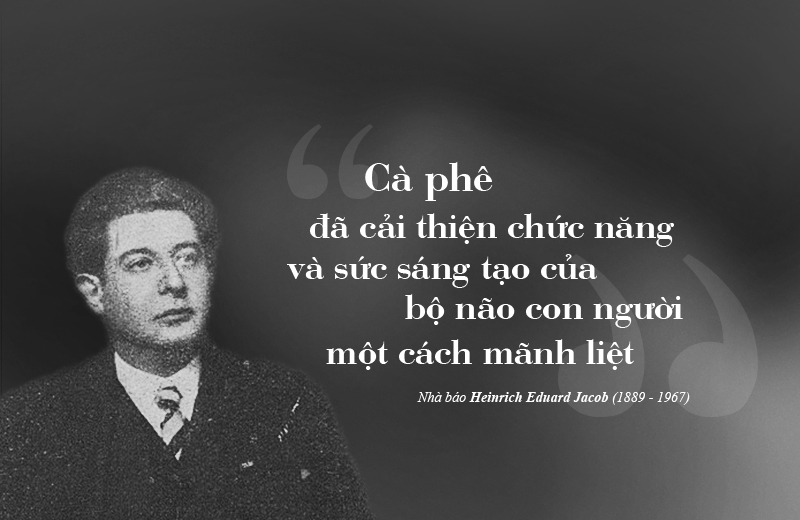
Coffee has dramatically improved the function and creativity of the human brain” – Journalist Heinrich Eduard Jacob (1889 – 1967)
The desire to inquire into the foundations of supreme happiness
Since ancient Greek and Chinese civilizations, through forms of contemplation, observation, and dialogue recorded and practiced by ancient philosophers and thinkers, humans have realized that living is not just about satisfying instinctual needs, but also about seeking and practicing good values to live a happier life.
The father of ancient Greek philosophy – philosopher Socrates (470 – 399 BC) encouraged the scholars of his time to focus more on the essential truth about human nature, rather than studying the natural world, which was the origin of the ethical thought of ancient Greeks. With his inquiries about the relationship between knowledge and virtue, he believed that knowledge must be linked to the ability to perceive and practice what is good, in order to bring happiness to oneself and to those around.
Các triết gia sơ khai như Plato (428 – 347 TCN), Aristotle (384 – 322 TCN), Epicurus (341 – 270 TCN)… cũng đi sâu tìm tòi và giải đáp những vấn đề liên quan đến đức hạnh, hành vi, cách cư xử đúng đắn của con người. Đây là các mô hình nền tảng, đóng góp sự phát triển rực rỡ của đạo đức học phương Tây về sau.
Early philosophers such as Plato (428 – 347 BC), Aristotle (384 – 322 BC), Epicurus (341 – 270 BC) also delved into and sought to answer questions related to virtue, behavior, and proper conduct of humans. These are the foundational models that contributed to the brilliant development of Western ethics later on.
From their presentations of viewpoints, debates, and dialectics, the early philosophers laid the foundation for the direction of “prescriptive ethics”, which dominated the field of moral philosophy for more than two millennia. Prescriptive ethics examines the values, principles, and moral standards, attempting to distinguish the true from the false, the good from the bad, the right from the wrong, in order to help choose behaviors that are conducive to bringing happiness to humans. Notably, the inquiry into ethics was not limited to human happiness alone, as philosophers also linked it to the existence, prosperity of the state, and the social order.
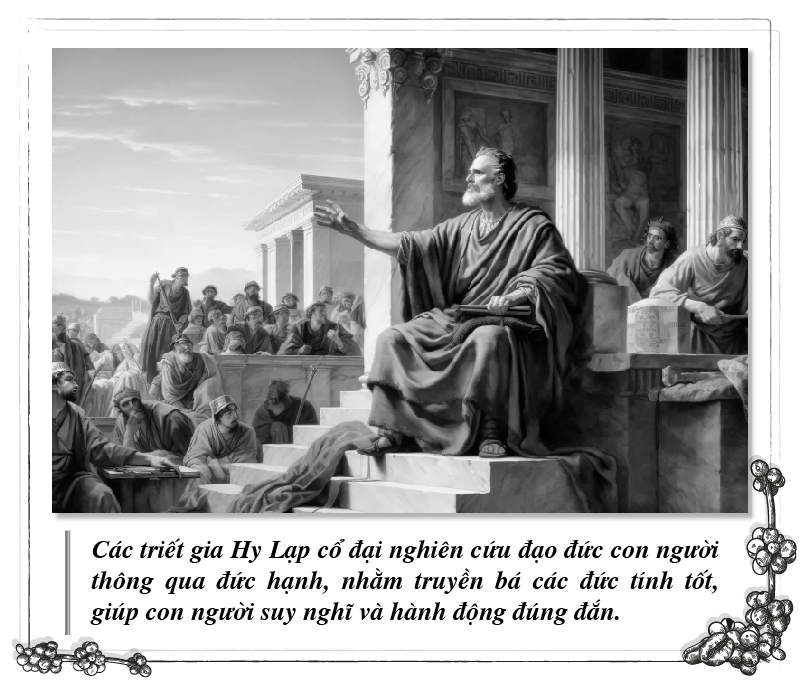
The ancient Greek philosophers studied human ethics through the lens of virtue, with the aim of propagating positive character traits that would help people think and act rightly.
By the 16th-17th centuries, a new intellectual class had emerged, regaining the freedom of thought and autonomy in decision-making to change the destiny of themselves and society. Humans became aware of their own power of creativity, of knowledge, and placed themselves at the center of all activities. As a result, philosophy was no longer under the dominance of theology, but rather returned to its function of searching for and discovering the truth, aiming towards the ultimate goal of human existence – the pursuit of a happy, perfect life. Alongside political, economic, and natural philosophy, ethics became a prominent area of philosophical research during this period. Ethics shifted its focus from the study of virtues and the right character of human nature, to examining how each individual should live their life, with the necessary standards and principles of conduct and character to achieve a happy life.
Driven by the desire to explore the nature and role of humans, as well as the ways to achieve happiness, philosophers such as Jeremy Bentham (1748-1832), John Stuart Mill (1806-1873), Immanuel Kant (1724-1804), Arthur Schopenhauer (1788-1860), and others of that time period, made efforts to decipher the various aspects surrounding human nature and behavior. From this, many new ethical theories were born, guiding people to pursue happiness through self-awareness and by establishing the right conduct within the community.
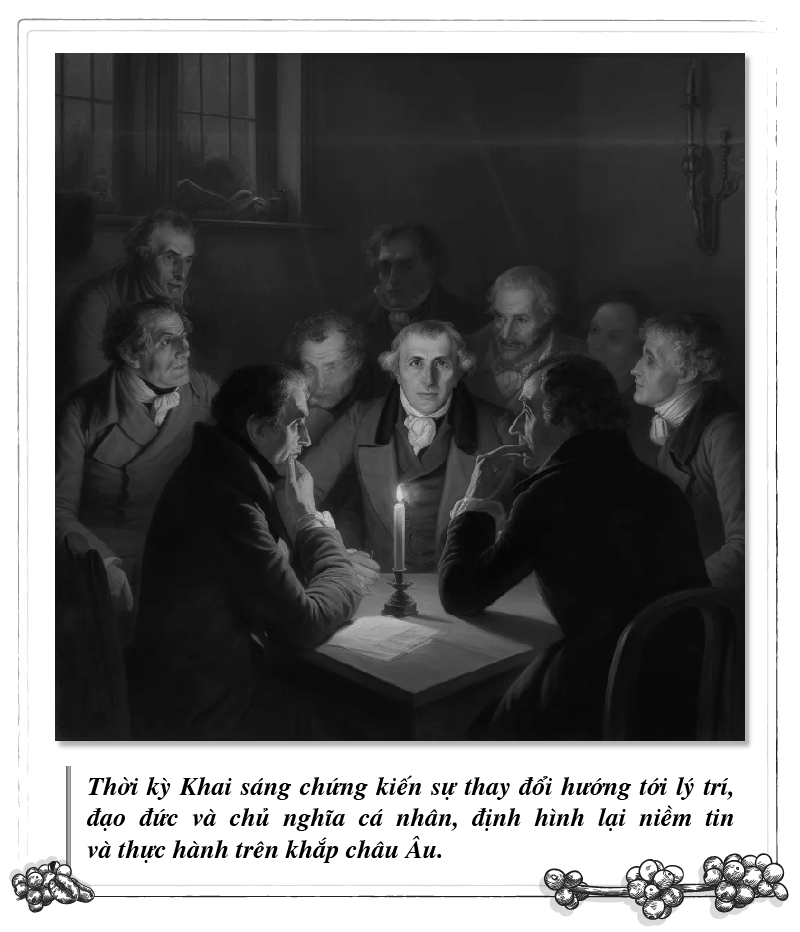
The Enlightenment period witnessed a shift towards reason, ethics, and individualism, which reshaped beliefs and practices across Europe.
Coffee – The energy that creates a truly happy lifestyle
In the 17th-18th centuries, European society underwent a powerful transformation in human consciousness, emphasizing the power of knowledge, the spirit of creativity, and the aspiration for a better life. This was also the period when coffee and coffee houses emerged across Europe, playing the role of a catalytic energy, elevating intellect during the Enlightenment era, and laying the foundation for the comprehensive transformation of Europe and the world.
Likened to a panacea for the brain, with a direct impact on the ability to focus, think, analyze and reason, coffee became the enlightening beverage that accompanied many intellectuals across philosophy, science, art, economics, and literature. Intellectuals all hailed coffee as an endless source of awakening and creativity. Notably, most of the key philosophers who were influential in the birth of major ethical schools of thought, such as Immanuel Kant (1724-1804), Jeremy Bentham (1748-1832), and Arthur Schopenhauer (1788-1860), always considered coffee an essential beverage.
The philosopher Immanuel Kant (1724-1804), the most influential figure in Western philosophy and the father of Kantian ethics, always insisted on having his coffee at the right time to stay alert and carry out his daily tasks. Kant’s coffee drinking habits were also emphasized several times in the essay “The Last Days of Immanuel Kant” (1827) by Thomas de Quincey. Kant’s ethics pointed out that the moral consciousness of the West had changed greatly since the time of the early philosophers Socrates, Plato, and Aristotle. It no longer focused on examining virtue, conduct, and the rightness of a person, but rather on researching the standards for evaluating moral behavior. New ethical categories were also formed, such as “consequences of behavior,” “intention of behavior,” “duty,” and “goodwill.” Kant’s most outstanding contribution to ethics was emphasizing that a person’s actions only have moral value when they are completely motivated by one’s own sense of duty. Kant also argued that the only absolute good is goodwill, and that the decisive factor in determining the moral correctness of an action is the will and motivation of the person carrying it out.
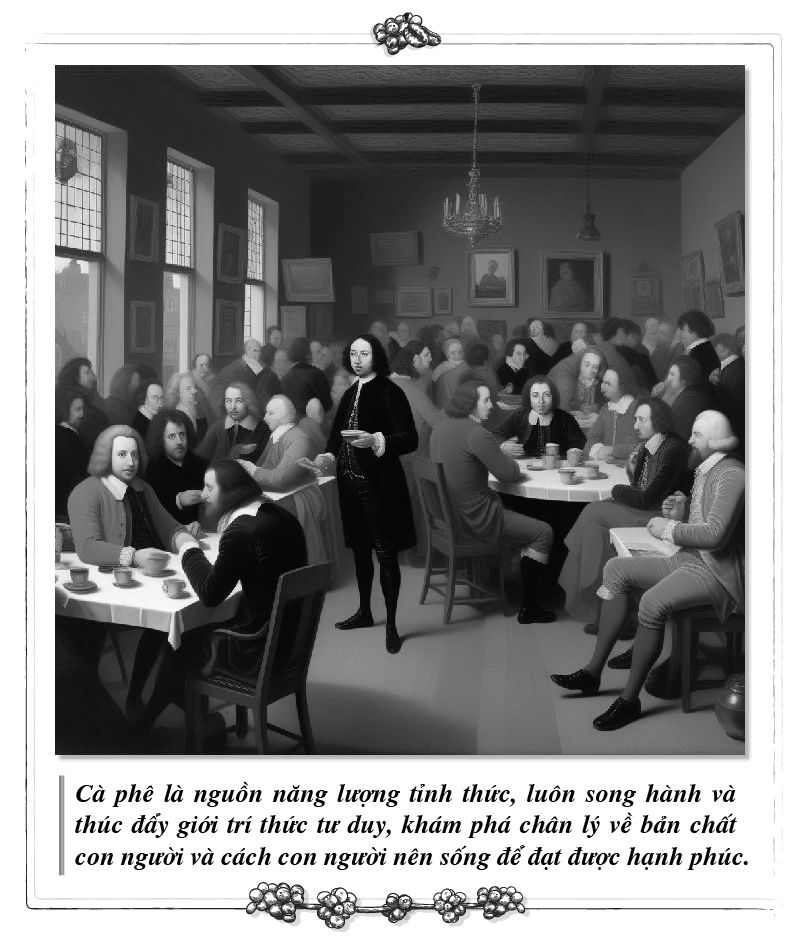
Coffee is a source of awakening energy, always accompanying and driving intellectuals to think, explore the truth about human nature, and how people should live to achieve happiness.
In the process of the formation and development of philosophy, new schools of thought and ideas have been shaped as philosophers continuously publicly presented and debated their perspectives to explain and seek the truth. With the characteristic of being an open space that welcomes all subjects and allows free discussion, coffee houses have become a reliable venue where intellectuals gather to research, debate, and explore the nature and psychology of human beings in society, creating the conditions for the birth of ethical theories that have influenced up to the present day.
At Queen’s Lane Coffee House in Oxford, England, philosopher Jeremy Bentham (1748-1832) frequently visited and first discovered the concept of utilitarianism. This is an ethical theory that argues actions should be judged as right or wrong based on the degree to which they increase or decrease the welfare or well-being of people. Jeremy Bentham transformed the principle of utilitarianism into the foundation for a unified and comprehensive ethical system that could be applied to every area of life. At the same time, he laid the groundwork for modern ethics and shaped the contemporary debates on ethics and human rights.
The coffee houses in Oxford were also where the philosopher Thomas Hobbes (1588-1679) participated in discussions to establish the social contract, helping to draw firm conclusions about ethics and politics. Hobbes’ arguments about the social contract have influenced the theories of many other philosophers, including John Locke, Jean-Jacques Rousseau, and Immanuel Kant. In France, the Café Procope was likewise a space for dialogue and debate among great philosophers such as Voltaire, Immanuel Kant, and Jean-Jacques Rousseau.
The German philosopher Arthur Schopenhauer (1788-1860), during his time living in Italy, would frequently visit the Caffè Greco, which was considered the center of the German community in Rome. Here, together with scholars and philosophers, Arthur Schopenhauer discussed philosophical ideas aimed at maximizing happiness and minimizing suffering in society. Deeply influenced by the thought of Immanuel Kant, Arthur Schopenhauer studied and critiqued Kant’s moral philosophy, developing a different perspective on ethics. He believed that ethics stems from compassion, which is clearly expressed in his works Ueber die Grundlage der Moral (On the Basis of Morality) and The Two Fundamental Problems of Ethics. Schopenhauer’s views on ethics were not focused on establishing strict rules or laws for people to follow, but rather on considering happiness, maintaining happiness, and not harming others. His ideas have had a significant influence on thinkers from various fields, such as the psychologist Sigmund Freud, the philosophers Ludwig Wittgenstein and Friedrich Nietzsche, and the physicist Erwin Schrödinger.
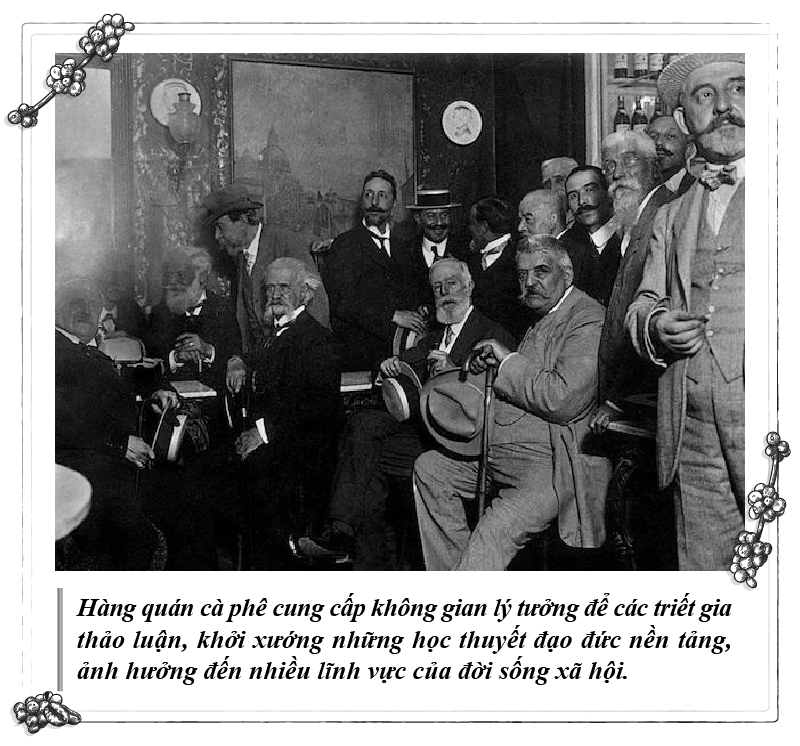
Coffee houses provided an ideal space for philosophers to discuss and initiate foundational ethical doctrines that have influenced many areas of social life.
With its power to awaken and inspire, coffee and coffee houses have become a catalytic force and a place that drives the search for answers about the nature of the human being, as well as the path towards a better, happier life.
With love and passion for coffee, the Trung Nguyen Legend Group has undertaken comprehensive research on the history of coffee and the influence of coffee on the progress of human civilization, creating three coffee civilizations: Ottoman, Roman, and Thiền (Meditation). Among these, Thiền coffee is created on the foundation of the universal philosophy of life from the East – a coffee civilization that originates from the East, which can have a more positive influence and change in today’s dynamic and complex world. This is the coffee philosophy created by the Founder and Chairman of the Trung Nguyen Legend Group, Dang Le Nguyen Vu, which is oriented towards awakening in the present, recognizing one’s purpose of living in relation to the community, and striving towards the values of Truth, Goodness, and Beauty, with the wisdom principles of Harmony, Respect, Purity, Accountability and Nurturing.
Readers are cordially invited to watch the series of The Tao of Coffee videos posted on https://bit.ly/caphetrietdao
Coming up: Immanuel Kant and the aspiration to establish the supreme ethical principles


